Euro 2008
Switzerland/Austria 2008
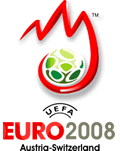 Euro 2008 was played in Austria and Switzerland, the second time two nations had acted as joint hosts. Four stadia in each country were upgraded for the competition although legal challenges to plans for the Hardturm in Zurich led the organisers to renovate Letisgrund, home of FC Zurich, instead.
Euro 2008 was played in Austria and Switzerland, the second time two nations had acted as joint hosts. Four stadia in each country were upgraded for the competition although legal challenges to plans for the Hardturm in Zurich led the organisers to renovate Letisgrund, home of FC Zurich, instead.
Group games were played in two cities (the format used in Euro 96) with the four seeded team playing all their group matches at the same venue. The remaining teams were ranked according to their record in the 2006 FIFA World Cup and the Euro qualifiers and then drawn from four pots so that equally ranked teams would not meet until the knock-out phase. This process attracted much criticism and was later revised. All the group games were played in front of capacity crowds.
This was the first competition in which the new version of the Henri Delaunay trophy was awarded to the winner.
Match by Match Reports: Group A | Group B | Group C | Group D | Knock-Out Stages
2004 | Euros Index | 2012
Group A
 Switzerland
Switzerland
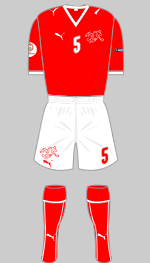
First
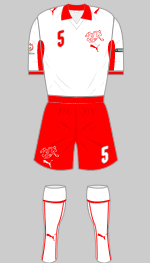
Second
Designer: Puma
Switzerland adopted the new Puma template, designed specifically for Euro 2008, in their traditional colours. This was the third time that the Swiss had appeared in the finals although their record in previous competitions was poor. As co-hosts they were not required to take part in the qualifying competition.
 Czech Republic
Czech Republic
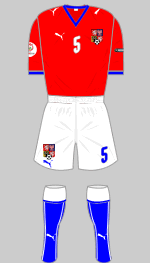
First
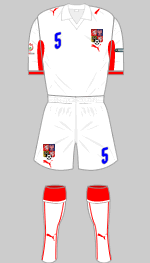
Second
Designer: Puma
Since the break up of Czechoslovakia in 1994, the Czech Republic had qualified twice for the Euros (1996, 2004) and were sixth in the FIFA World Rankings. 
 Portugal
Portugal
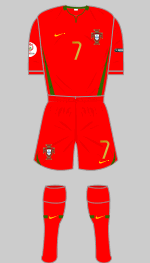
First
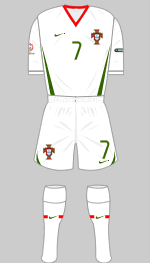
Second
Designer: Nike
After several years playing in dark red, Portugal returned to a more traditional shade with green trimmings.
 Turkey
Turkey

First
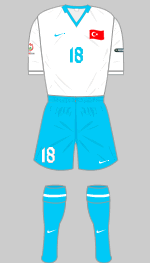
Second
Designer: Nike
The traditional chest band made a welcome return for the Euros, a feature that goes back to 1923 and the formation of the Turkish Football Federation. The new change kit was a radical departure from the strips used in the past.
Group B
 Austria
Austria

First
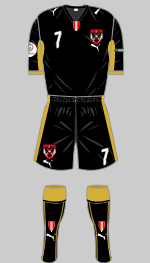
Second
Designer: Puma
Austria traditionally play in white shirts and black shorts but for Euro 2008 they switched to red/white, their usual choice of change colours. This meant that the co-hosts wore similar strips in the tournament.
The black change strip was not used.

 Croatia
Croatia
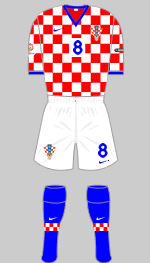
First
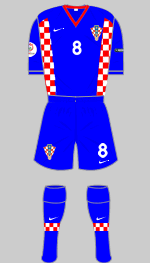
Second
Designer: Nike
Sadly Croatia's distinctive checkered shirt did not grace the tournament and they wore their blue strip in all their games.
 Germany
Germany
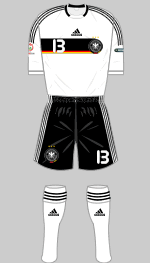
First
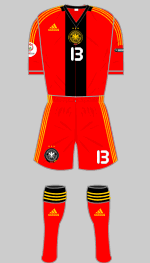
Second
Designer: Adidas
Three stars were embroidered above the DFB badge to signify Germany's three European Championship titles. As usual, Adidas designed an elegant "home" kit in traditional colours. The rather jarring red alternative kit was not used.
 Poland
Poland
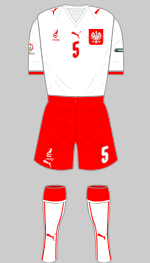
First
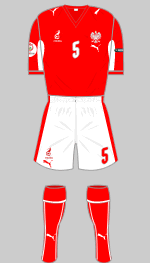
Second
Designer: Puma
Poland's traditional white shirts and red shorts echo their national flag and are usually reversed for the change strip. This was their first appearance in the European Championship finals.
Group C
 Netherlands
Netherlands
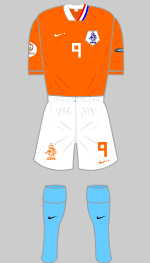
First
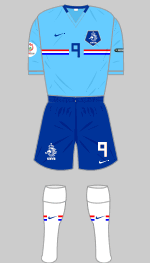
Second
Designer: Nike
The Dutch played in traditional bright orange enhanced by light blue stockings. This combination was chosen because they are the colours of the Dutch royal family, the House of Orange-Nassau. The colours of the modern republic feature on the collar and across the chest of the change strip. This alternative was not needed in the competition.
 Italy
Italy
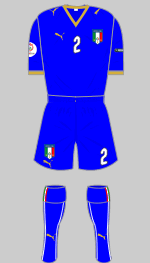
First
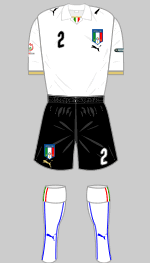
Second
Designer: Puma
Rather like the Dutch, the Italians play in the colours of the former Italian royal family, the House of Savoy, rather than the colours of the Italian Republic. The white change shirts were used once but were worn with white shorts rather than the black ones registered before the tournament.
 Romania
Romania
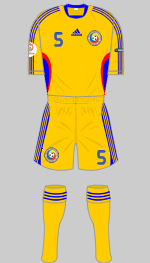
First
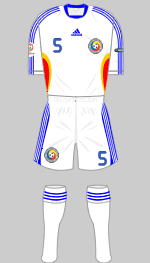
Second
Designer: Adidas
Although a strong team in their own right, Romania were considered the weakest of the four in Group C.
 France
France
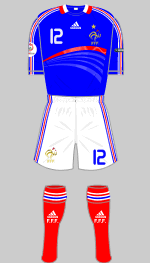
First
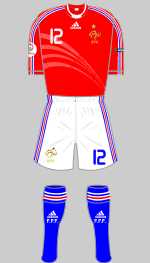
Second
Designer: Adidas
France reached the World Cup final in 2006 but they were not the side of a decade earlier that had carried off the World Cup and European Championship in successive competitions. Rather elegant swirling stripes enhanced both their new kits. The red change shirts marked a brief return to an old tradition: this was their usual change kit before white strips were adopted in 1960.
In fact neither strip was used: France played all their games in all-blue.
Group D
 Greece
Greece
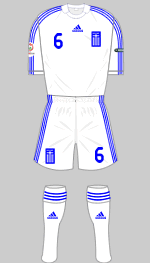
First
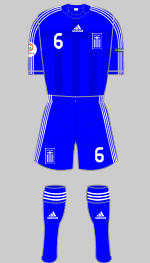
Second
Designer: Adidas
The defending champions were surprise winners in 2004 but there was no repeat performance this time round. They lost all their games and finished bottom of the group. The team had adopted the all-white strip worn in the 2004 final as their first choice. The blue change kit was not required.
 Sweden
Sweden
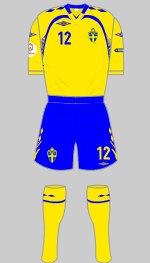
First
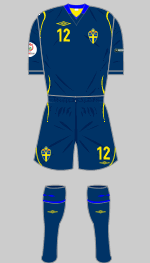
Second
Designer: Umbro
Sweden's home kit, by UK manufacturer Umbro, was in their traditional colours while the navy change strip was a new departure. This was not used in the competition.
 Spain
Spain
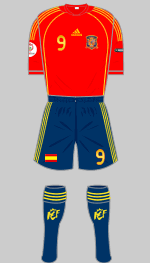
First
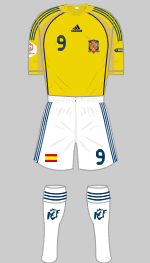
Second
Designer: Spain
Spain had been perpetual under-achievers in both the European Championships and the World Cup but this was about to change. Adidas' home kit was in traditional colours and matched with mustard yellow change shirts and matching white shorts/socks.
 Russia
Russia
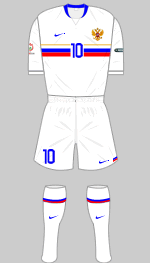
First
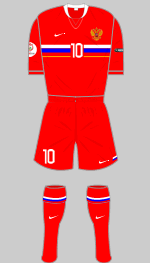
Second
Designer: Nike
The Russian team is recognised by UEFA and FIFA as the successor to the USSR and CIS teams of the past. After the break-up of the Soviet Union in 1991, they wore all-white with the Russian tricolour across the  chest.
chest.
| Group A | Group B | Group C | Group D | Knock-Out Stages |
| 2004 | Euros Index | 2012 |
 Euro 2008 was played in Austria and Switzerland, the second time two nations had acted as joint hosts. Four stadia in each country were upgraded for the competition although legal challenges to plans for the Hardturm in Zurich led the organisers to renovate Letisgrund, home of FC Zurich, instead.
Euro 2008 was played in Austria and Switzerland, the second time two nations had acted as joint hosts. Four stadia in each country were upgraded for the competition although legal challenges to plans for the Hardturm in Zurich led the organisers to renovate Letisgrund, home of FC Zurich, instead. Switzerland
Switzerland

 Czech Republic
Czech Republic

 Portugal
Portugal

 Turkey
Turkey

 Austria
Austria

 Croatia
Croatia

 Germany
Germany

 Poland
Poland

 Netherlands
Netherlands

 Italy
Italy

 Romania
Romania

 France
France

 Greece
Greece

 Sweden
Sweden

 Spain
Spain

 Russia
Russia
